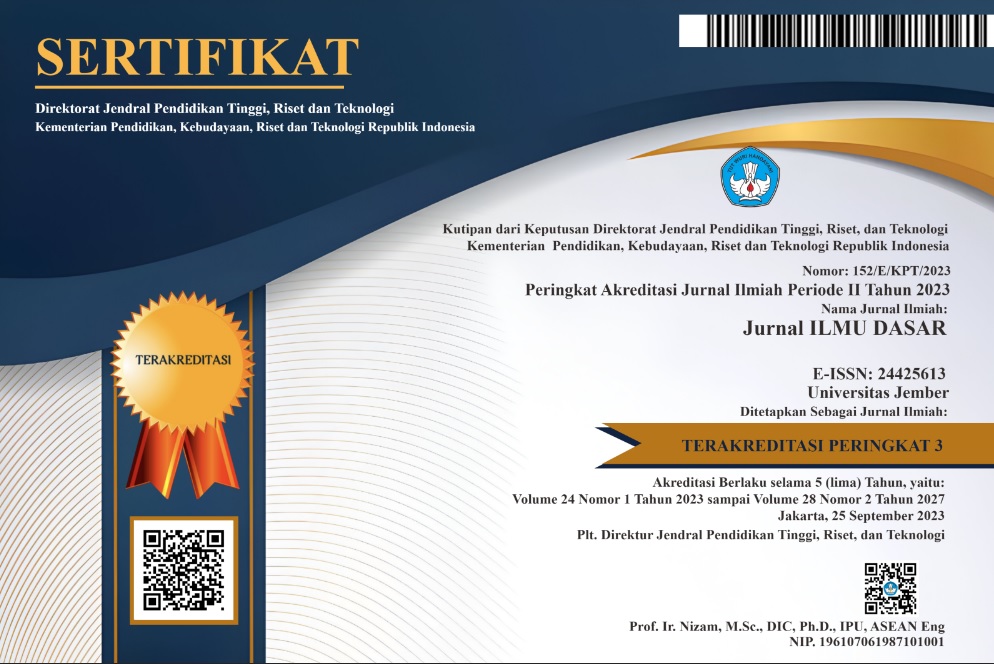Environmental Isotope of Radon-222 for Ciliwung River and Shallow Groundwater Interaction Study
DOI:
https://doi.org/10.19184/jid.v21i2.11940Abstract
Aquifer in river bank area is mostly susceptive toward pollution occurring in river. One of parameters to determine the interaction process between groundwater and river is a natural isotope of 222Rn. The significant difference of radon concentration in groundwater and river water can be utilized as a scientific basis for investigating groundwater infiltration in river bank. Those studied parameters are residence time and infiltration rate. The research using 222Rn had been conducted in shallow groundwater of Ciliwung river bank - South Jakarta during rainy and dry season. The range of 222Rn concentration in shallow groundwater monitored in dry season was between 666 - 2590 Bq/m3 which was higher than that of rainy season ranging at 440 to 1546 Bq/m3. Otherwise, concentration of 222Rn in river water could not be detected (its 222Rn concentration = 0 Bq/m3) due to its much lower concentration either rainy or dry season. During dry season monitoring, equilibration between groundwater and river water was reached at the distance approximately 98 - 140 m away from river side. Estimating residence time based on 222Rn concentration at nearest site from the river and at equlibration area was 4.2 days such that the infiltration rate from river water into aquifer might be 7.8 m/day.
Keywords: 222Rn, groundwater, residence time, infiltration rate.
Downloads
References
Bhal, S. K. 2019. Application Note Lipophilicity Descriptors: Understanding When to Use Log P & Log D Application of Lipophilicity Descriptors in Drug. Adv. Chem. Dev. 3–6.
Black C. D., Herring M. P., Hurley D. J., and O’Connor P. J. 2010. Ginger (Zingiber officinale) reduces muscle pain caused by eccentric exercise. J. Pain. 11(9): 894-903.
Fajrin F. A., Nugroho A. E., Nurrochmad, A. and Susilowati R. 2018. Molecular docking analysis of ginger active compound on transient receptor potential cation channel subfamily V member 1 (TRPV1). Indones. J. Chem. 18(1): 179-185.
Gaire B.P., Kwon O.W., Park S.H., Chun K-H.,Kim S.Y., Shin D.Y., Choi J.W. 2015. Neuroprotective effect of 6-paradol in focal cerebral ischemia involves the attenuation of neuroinflammatory responses in activated microglia. Plos One. 10(3): 1-17.
Gram, Dorte X., Hansen, Anker J., Deacon, Carolyn F., Brand, Christian L., Ribel, Ulla, Wilken, Michael, Carr, Richard D., Svendsen, Ove, and Ahrén, Bo. 2005. Sensory nerve desensitization by resiniferatoxin improves glucose tolerance and increases insulin secretion in Zucker Diabetic Fatty rats and is associated with reduced plasma activity of dipeptidyl peptidase IV. Eur. J. Pharmacol. 509(2–3): 211-217.
Haghighi M., Khalvat A., Toliat T., and Jallaei S.2005. Comparing The Effects Of Ginger (Zingiber officinale) Extract And Ibuprofen On Patients With Osteoarthritis. Arch Iran. Med. 8(4): 267-271.
Hutapea F. S., Kembuan, Mieke A. H. N., and P.S., Junita Maja. 2016. Gambaran klinis neuropati pada pasien diabetes melitus di Poliklinik Neurologi RSUP Prof. Dr. R. D. Kandou periode Juli 2014 – Juni 2015.e-Clinic. 4(1).
Jo, S.K., Kim, I.S., Rehman, S.U., Ha, S.K., Park, H.Y., Park, Y.K., Yoo, H.H. 2016. Characterization of metabolites produced from the biotransformation of 6-shogaol formed by Aspergillus niger.Eur. Food Res. Technol. 242(1): 137-142.
Kano M., Ohno-Shosaku T., Hashimotodani Y., Uchigashima M., and Watanabe M. 2009. Endocannabinoid-mediated control of synaptic transmission.Physiol. Rev. 89(1): 309-380.
Keum, Y.S., Kim, J., Lee, K.H., Park, K.K., Surh, Y.J., Lee, J.M., Lee, S.S., Yoon, J.H., Joo, S.Y., Cha, I.H., Yook, J.I. 2002. Induction of apoptosis and caspase-3 activation by chemopreventive [6]-paradol and structurally related compounds in KB cells.Cancer Lett. 177(1): 41-47.
Mantiri N.C., Awaloei H., and Posangi J. 2013. Perbandingan Efek Analgesik Perasan Rimpang Jahe Merah (Zingiber officinale var. rubrum Thelaide) Dengan Aspirin Dosis Terapi Pada Mencit (Mus musculus. J. e-Biomedik. 1(1): 518-523.
Nurtjahja-Tjendraputra E., Ammit A. J., Roufogalis B. D., Tran V. H., and Duke C. C. 2003. Effective anti-platelet and COX-1 enzyme inhibitors from pungent constituents of ginger. Thromb. Res. 111(4–5): 259–265.
Pabbidi R. M., Yu S. Q., Peng S., Khardori R., Pauza M. E., and Premkumar L. S. 2008. Influence of TRPV1 on diabetes-induced alterations in thermal pain sensitivity.Mol. Pain. 4: 1–17.
Puspaningtyas A. R. 2012. Molekular Docking dengan Metode Molegro Virtual Docker Turunan Kalkon sebagai Antimikroba. Stomatognatic (J.K.G Unej). 9(1): 39-47.
Smith H. S. and Argoff C. E. 2013. Pharmacological treatment of neuropathic pain. Pain Int. Res. Pain Manag. 71(5): 203-226.
Su, K., Wook, D., Soo, Y., Seop, M., Park, S., Choi, S., Pearce, L.V. Blumberg, P.M., Lee, J. 2011. Bioorganic & Medicinal Chemistry Letters Receptor activity and conformational analysis of 5 0 -halogenated resiniferatoxin analogs as TRPV1 ligands. Bioorg. Med. Chem. Lett. 21(1): 299-302.
Suhud, F. 2015. Uji aktivitas in-silico senyawa baru 1-benzil-3-benzoilurea induk dan tersubstitusi sebagai agen antiproliferatif. Jurnal Farmasi Indonesia. 7(4): 242-251.
Suri A. and Szallasi A. 2008. The emerging role of TRPV1 in diabetes and obesity. Trends Pharmacol. Sci. 29(1): 29-36.
Wahyuliati T. 2006. Antidepresan pada nyeri neuropati diabetik. Mutiara Medika. 6(1): 33-41.
Wei, C.K, Tsai, Y.H., Korinek, M., Hung, P.H., El-Shazly, M., Cheng, Y.B., Wu, Y.C., Hsieh, T.J., Chang, F.R. 2017. 6-Paradol and 6-Shogaol, the Pungent Compounds of Ginger, Promote Glucose Utilization in Adipocytes and Myotubes, and 6-Paradol Reduces Blood Glucose in High-Fat Diet-Fed Mice.Int. J. Mol. Sci. 18(1): 1-18.








